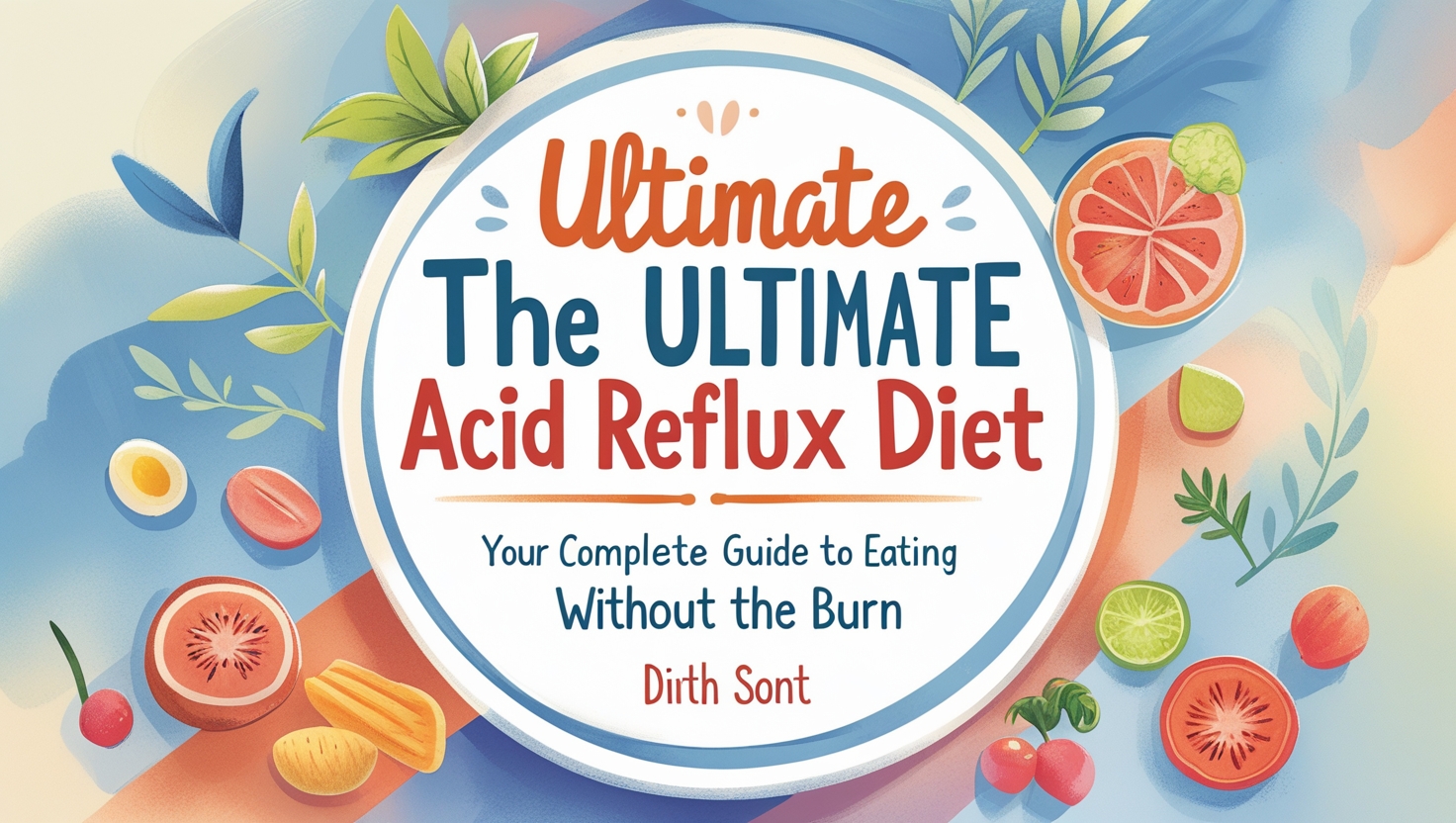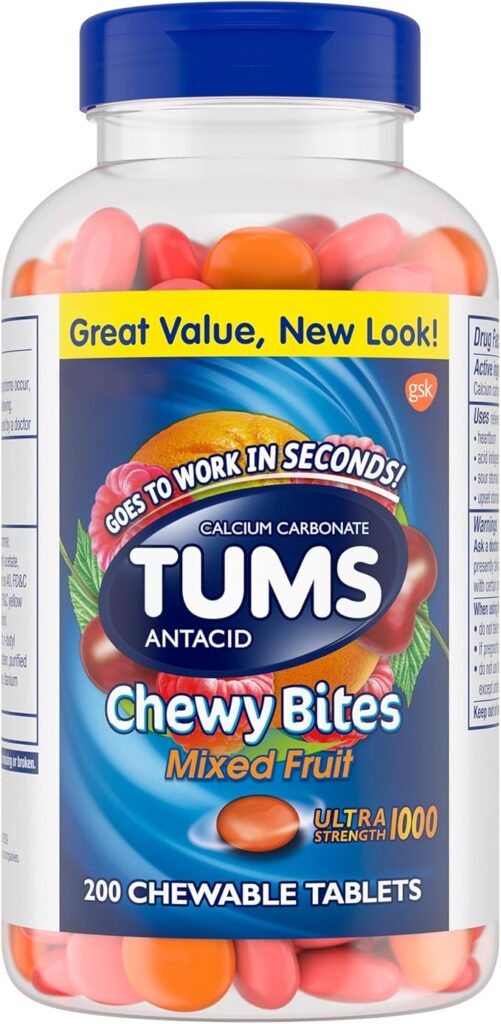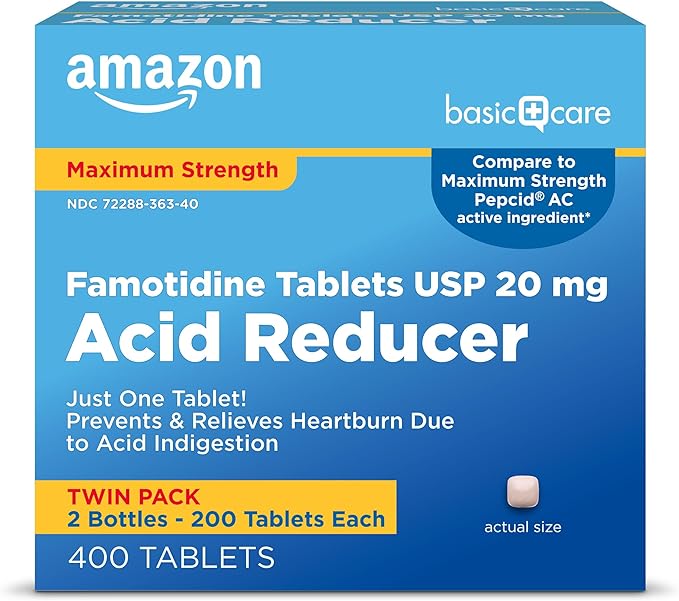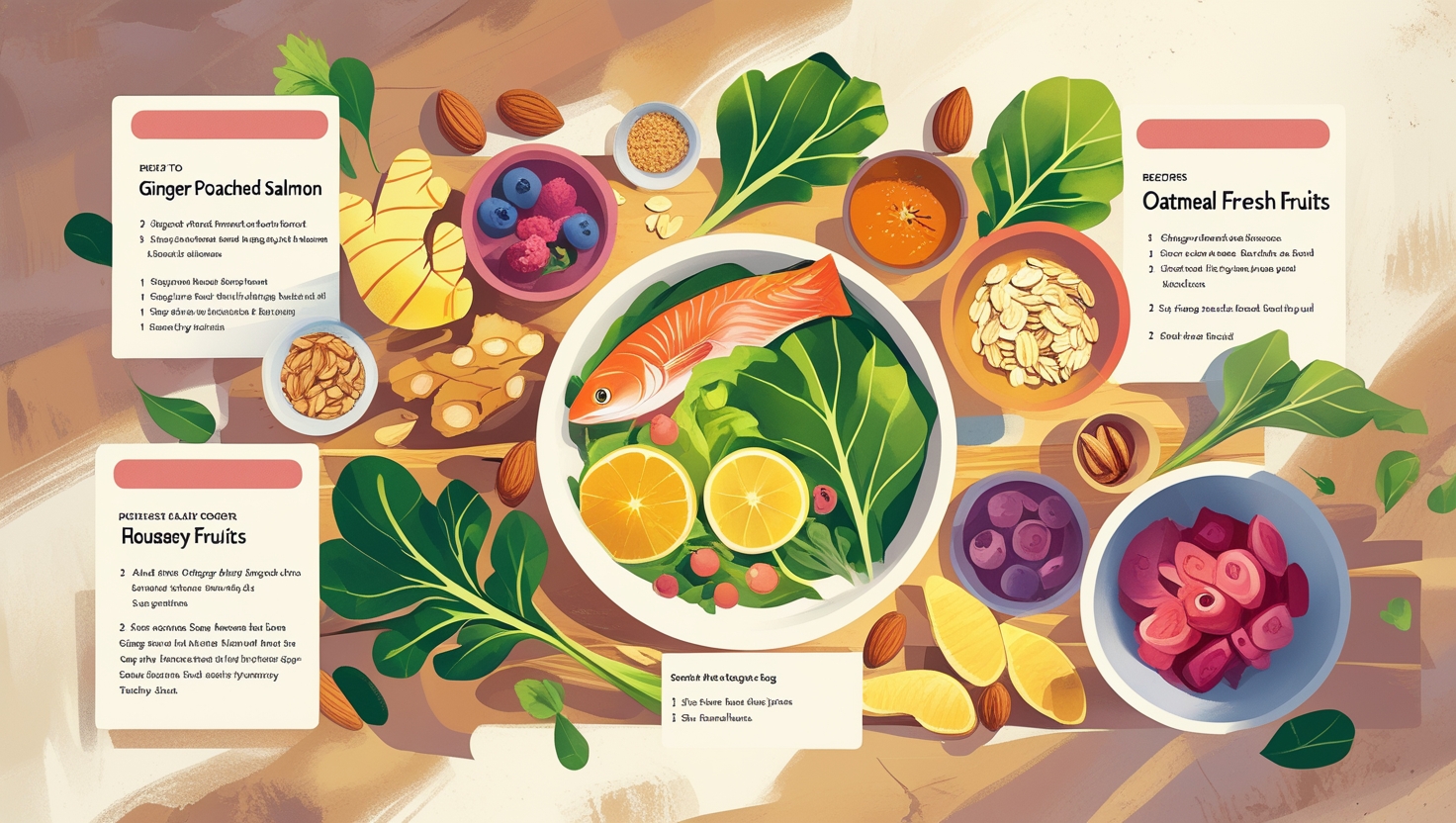Acid Reflux Diet Guide: Foods to Eat & Avoid for GERD Relief

Living with acid reflux doesn't mean you're doomed to bland, boring meals forever. This comprehensive guide reveals exactly which foods can become your allies in the fight against GERD – and which ones are secretly sabotaging your digestive peace.
Ah, the midnight burn! You know that feeling, don't you? One minute you're enjoying a delicious dinner, and the next – BAM! – your chest feels like it's hosting a bonfire. Welcome to the not-so-exclusive club of acid reflux sufferers, where approximately 20% of Americans hold unwanted membership.
But here's the kicker: what you eat can either be your worst enemy or your greatest ally in this battle. That's where a strategic acid reflux diet comes into play – and trust me, it's not as restrictive as you might think.
What Exactly IS Acid Reflux, Anyway?
Let's get down to brass tacks. Acid reflux, medically known as gastroesophageal reflux disease (GERD), occurs when stomach acid backs up into your esophagus. Think of your lower esophageal sphincter (LES) as a one-way valve – when it's working properly, food goes down and stays down. When it's not? Well, that's when things get interesting… and painful.
The symptoms can range from the classic heartburn sensation to more subtle signs like chronic cough, hoarseness, or that annoying feeling of a lump in your throat. Some folks even experience what's called “silent reflux” – where the acid creeps up without the telltale burning sensation. Sneaky, right?

The Foundation of an Effective Acid Reflux Diet
Now, here's where things get exciting! An acid reflux diet isn't about deprivation – it's about making smart choices that work WITH your body, not against it. The goal is simple: minimize acid production, reduce inflammation, and keep that pesky LES functioning like the champion it's meant to be.
Research from the American Gastroenterological Association shows that dietary modifications can reduce GERD symptoms by up to 70% in many patients. That's pretty impressive for something as simple as changing what's on your plate! The key lies in understanding which foods are pH-balanced, anti-inflammatory, and gentle on your digestive system.
Foods That Are Your New Best Friends
Alkaline Powerhouses
First up in our acid reflux diet hall of fame: alkaline foods. These beautiful, pH-balancing champions help neutralize excess stomach acid naturally. We're talking about:
- Leafy greens (spinach, kale, arugula)
- Cucumber and other cooling vegetables
- Bananas (but skip the green ones – they're too acidic)
- Melons like cantaloupe and honeydew
- Cauliflower and broccoli
Here's a pro tip: aim for foods with a pH above 4.6. Why that magic number? Because anything below it tends to trigger acid production. It's like having a secret weapon in your back pocket!
Lean Proteins That Don't Fight Back
Protein is crucial, but not all proteins are created equal in the acid reflux diet world. Your digestive system will thank you for choosing:
- Skinless chicken breast (grilled or baked, never fried)
- Fish like salmon, cod, and tilapia
- Turkey (white meat preferred)
- Egg whites (sorry, yolks can be troublesome for some)
- Plant-based proteins like tofu and tempeh
The secret sauce? These proteins are easier to digest and won't sit in your stomach like a lead balloon, reducing the likelihood of acid backup.
Healthy Fats That Heal
Contrary to popular belief, not all fats are the enemy in an acid reflux diet. The trick is choosing the RIGHT kinds:
Good fats include:
- Olive oil (extra virgin, please!)
- Avocados (in moderation)
- Nuts like almonds and walnuts
- Seeds such as flax and chia
These healthy fats actually help reduce inflammation in your digestive tract. However – and this is important – portion control is KEY. Even good fats can slow digestion if you go overboard.
The Troublemaker Foods: What to Limit or Avoid
Acidic Culprits
Okay, time for some tough love. These foods might taste amazing, but they're like adding fuel to the fire in your chest:
High-acid foods to minimize:
- Citrus fruits and juices
- Tomatoes and tomato-based products
- Vinegar and pickled foods
- Cranberries and other tart berries
Now, I'm not saying you can NEVER have these again – life's too short for that nonsense! But timing and quantity matter. Maybe save that orange juice for later in the day when your stomach's had time to settle.
The Usual Suspects
These foods have earned their reputation as GERD triggers for good reason:
- Spicy foods (sorry, hot sauce lovers!)
- Chocolate (I know, I know… life's cruel sometimes)
- Mint (yes, even “soothing” peppermint can backfire)
- Onions and garlic (raw forms are the worst offenders)
- High-fat foods like fried items and fatty meats
The thing is, triggers can be highly individual. What sends your neighbor running for antacids might not bother you at all. That's why keeping a food diary can be incredibly enlightening!
Smart Eating Strategies for Acid Reflux Diet Success
Timing Is Everything
When you eat can be just as important as what you eat in an acid reflux diet. Here are some game-changing strategies:
The 3-hour rule: Stop eating at least 3 hours before bedtime. Gravity is your friend when you're upright! Lying down with a full stomach is like inviting trouble to the party.
Smaller, frequent meals: Instead of three large meals, try 5-6 smaller ones throughout the day. This prevents your stomach from becoming overly full and putting pressure on that LES we talked about earlier.
Preparation Methods Matter
How you cook your food can make or break your acid reflux diet success:
- Grilling, baking, steaming = Good
- Frying, deep-frying = Not so much
- Boiling = Great for vegetables
- Raw preparations = Proceed with caution
Pro tip: Slow cooking methods often break down proteins and fibers, making them easier on your digestive system.
Beverages: What to Sip and What to Skip
Acid Reflux Diet-Friendly Drinks
Staying hydrated is crucial, but choose your beverages wisely:
Great choices:
- Water (still, not sparkling)
- Herbal teas like ginger or chamomile
- Almond milk
- Coconut water (unsweetened)
Ginger tea deserves special mention – this golden root has natural anti-inflammatory properties and can actually help reduce nausea and stomach upset.
Beverages to Approach Cautiously
- Coffee (try low-acid varieties or cold brew)
- Alcohol (especially wine and beer)
- Carbonated drinks (the bubbles can increase pressure)
- Citrus juices
Here's a reality check: you don't have to give up coffee entirely if you're a devoted fan. Try switching to a low-acid brand, adding a pinch of baking soda to neutralize acidity, or switching to cold brew, which naturally has lower acid levels.
Meal Planning Made Simple
Sample Day on an Acid Reflux Diet
Breakfast:
- Oatmeal with sliced banana and a drizzle of honey
- Herbal tea
Mid-morning snack:
- A small handful of almonds
Lunch:
- Grilled chicken salad with leafy greens and cucumber
- Olive oil and herb dressing
- Melon slices
Afternoon snack:
- Rice cakes with a thin layer of almond butter
Dinner:
- Baked salmon with steamed broccoli
- Brown rice
- Small side salad
Evening snack (if needed):
- Chamomile tea
Prep Like a Pro
Meal prepping can be a lifesaver when you're following an acid reflux diet. Spend Sunday afternoon preparing:
- Pre-cooked lean proteins
- Washed and chopped vegetables
- Cooked grains like quinoa and brown rice
- Homemade low-acid salad dressings
This way, you're never caught off-guard and tempted to grab something that might trigger symptoms.
Frequently Asked Questions About Acid Reflux Diet
Q: Can I ever eat spicy food again? A: Most people can gradually reintroduce mild spices once their symptoms are under control. Start small and pay attention to your body's reactions.
Q: Is it true that drinking water with meals is bad for acid reflux? A: There's some debate here, but excessive water during meals can dilute stomach acid, potentially slowing digestion. Try sipping small amounts instead of gulping.
Q: How long before I see improvements on an acid reflux diet? A: Many people notice improvements within 2-4 weeks of consistent dietary changes. However, healing takes time – be patient with yourself!
Q: Can stress affect my acid reflux even with a perfect diet? A: Absolutely! Stress can increase stomach acid production and slow digestion. Consider incorporating stress management techniques alongside your dietary changes.
Q: Are there any supplements that can help? A: Some people find relief with digestive enzymes, probiotics, or DGL (deglycyrrhizinated licorice). However, always consult with your healthcare provider before starting any supplements.
Beyond Diet: Lifestyle Factors That Matter
While an acid reflux diet is incredibly powerful, it works best when combined with other lifestyle modifications:
Weight management: Excess weight, especially around the midsection, can put additional pressure on your stomach and LES. Even a modest weight loss can make a significant difference.
Sleep positioning: Elevating your head 6-8 inches while sleeping can help prevent nighttime reflux. Some people find success with a wedge pillow or adjustable bed.
Clothing choices: Believe it or not, tight belts and clothing can worsen symptoms by increasing abdominal pressure.
Working with Healthcare Professionals
Here's the bottom line: while dietary changes can be incredibly effective, severe or persistent acid reflux symptoms warrant medical attention. Don't try to tough it out if you're experiencing symptoms more than twice a week.
According to the National Institute of Diabetes and Digestive and Kidney Diseases, untreated GERD can lead to serious complications including esophageal damage, narrowing, and even increased cancer risk. Your healthcare provider might recommend medications alongside dietary changes, especially initially.
Final Thoughts: Your Journey to Digestive Peace
Embarking on an acid reflux diet journey might seem daunting at first, but remember – you're not alone in this. Millions of people successfully manage their symptoms through smart food choices and lifestyle modifications every single day.
The beautiful thing about this approach is that it's not just about avoiding symptoms – you're actually nourishing your body with wholesome, healing foods that benefit your overall health. Many people discover they have more energy, better sleep, and improved digestion beyond just reflux relief.
Start small, be consistent, and most importantly, be patient with yourself. Rome wasn't built in a day, and your digestive healing won't happen overnight either. But with each mindful food choice, you're taking a step toward long-term relief and better health.
Remember, knowledge is power, but implementation is everything. Take what you've learned here, adapt it to your lifestyle, and don't be afraid to experiment (safely) to find what works best for your unique body.
Here's to eating well and feeling better – you've got this!







